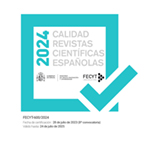A Comparison of the Spanish and English translation of the Chinese novel "Beijing Coma"
Abstract
Beijing Coma is a novel, in which the protagonist Dai Wei tells the Tiananmen events through his memories. After being shot in the Tiananmen Square on June 4, 1989, Dai Wei fell into a coma. Ten years later, he awakes, however, in a paralyzed body, discovering that the world outside has changed and that the citizens’ memories, except of a “vegetable”, have been erased by the government. This study compares the Spanish and English versions of the Chinese novel, with the intention to explore the ideology and translation strategies used by the translators. Since there has been few translation analysis based on the Chinese and Spanish language pairs, this research is expected to provide empirical and pioneering values to observing the objective and mainstream trend in translation.Downloads
Article download
License
In order to support the global exchange of knowledge, the journal Estudios de Traducción is allowing unrestricted access to its content as from its publication in this electronic edition, and as such it is an open-access journal. The originals published in this journal are the property of the Complutense University of Madrid and any reproduction thereof in full or in part must cite the source. All content is distributed under a Creative Commons Attribution 4.0 use and distribution licence (CC BY 4.0). This circumstance must be expressly stated in these terms where necessary. You can view the summary and the complete legal text of the licence.









